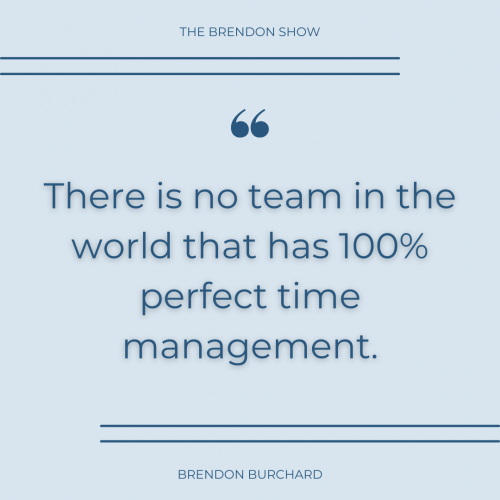- “The more that you can establish the rhythm to meet the objectives of the team the better. Always start with what you’re trying to do, build a rhythm, and then everything will fall into place.”
- Managing a team can be incredibly challenging in the workplace but also rewarding for the manager and the entire team. In this episode, listen to Brendon discuss some tips and strategies for managing a team effectively.
- “There is no team in the world that has 100% perfect time management.”
- Ready to take your team’s performance to the next level? Then this episode is for you! Watch as Brendon shares his four most important aspects of a productive team. Get ready to level up!
- Watch the video to get the full teaching!
HOT NEWS & DEALS!
-
Take the High Performance Indicator Assessment!
What’s your life success score? In just 5 minutes, get 6 research-backed “habit scores” that tell you how likely you are to succeed over the long-term. Based on the world’s largest study of high performers. Take the assessment HERE!
-
Get the GrowthDay app!
Make self-improvement a way of life and get the GrowthDay app! GrowthDay features all your personal development tools, coaching and community in one place. Write your journal, track your habits, take wellness challenges, watch live influencers teaching new life strategies, and join a global community of positive and supportive high achievers excited to improve their lives! Get the app on Apple app store here. Get on Android here. Get desktop here.
DID YOU KNOW?
I give weekly prizes, gratitude and shout-outs to our students, so post a screenshot or video on Instagram and use #TheBrendonShow! I can’t wait to hear your thoughts about this episode!
GET DAILY INSPIRATIONAL QUOTES HERE!


FULL TRANSCRIPT
[The following is the full transcript of this episode of Motivation With Brendon Burchard. Please note that this episode, like all episodes, features Brendon speaking extemporaneously–he is unscripted and unedited. Filmed in one take, Motivation With Brendon Burchard has become one of the most viewed unscripted, direct-to-camera self-help series in the history of YouTube. It has also been the #1 Podcast in all of iTunes and is regularly in the top podcasts in the Self-Help and Health categories around the globe. Subscribe to the free motivational podcast on iTunes or Stitcher.)
1. Establish the Rhythm
I think these are the most important four points if you’re trying to manage a team or family. Right? So family or team? We’ll just say team, but your team might be your family. Your team might be paid employees. Your team might be people at work. The number one role, if you’re the leader, is this— you’ve got to establish the rhythm of the company, the rhythm of the family, the rhythm of the team. What’s that mean? It means everybody on your team needs to know what they should be doing every single week. That’s the job. What should people do? That’s their week. These are the major activities that they should be doing each week to maintain sanity, order, revenue, and operations. Your rhythm is like your maintenance rhythm. It’s like this. This just has to happen. This is the bare minimum we all have to do every single week. And every person in every role should know their rhythm. There’s a rhythm. Like that’s your meeting cadence that you set up for yourself or for your team. It’s the output cadence that you’re setting up for yourself or your team.
I just call it the rhythm, and everyone should know what their rhythm is and they should know what their counterpart, their team, their others like. What are we all doing here?
The more that you can establish that rhythm, the better you can meet the objectives of the team.
Again, that’s whether your family or your team that you’re at with work the better. So you always start with what are we trying to do, right? What are we trying to do? Let’s build a rhythm for that. Once we know what we’re trying to do and there’s a rhythm for that, everything starts to fall into place. You’ve got to learn to establish and manage the rhythm.
2. Hire High Performers Who Drive
Second, I think with team management, you’ve got to hire high performers who drive, or you may be singular there, but let’s use the plural. You got to hire high performers who drive or you got to have somebody in your life, a high performer, who drives. And this is important. For those of you like “Brendon, you don’t understand I’m a Creative. Don’t make me manage a schedule. I’m successful without any calendar in my life, ever.” I’m like, Awesome. I don’t want to take away freedom from you. But if you are successful already without ever having done any of this, imagine where you’ll be when you just add this component. So if that’s not your quote-unquote style or preference, please realize your style of preference has nothing to do with what your big goals or objectives in life might be.
My style and preference weren’t to be a motivational speaker at all. I wanted to write and make an impact on people’s personal development. I needed to become a writer. That wasn’t my style. I wasn’t a natural writer. It wasn’t my style to do videos. It wasn’t my preference to talk on stage. I’d rather throw up. In fact, I famously threw up backstage and on stage. So I’m not somebody who feels like your style, your strengths, your preference, your natural abilities. Those are all great, but that doesn’t mean they’re sufficient. You need to hire a driver, an integrator, an operator, somebody in your life who drives the agenda for you, who manages you. Right? Hire someone Who literally keeps you accountable, who builds the calendar and the rhythm and the structure for you. If you’re not going to do it, then the job is to get somebody to do it. All right. Some of you, you’re the visionary, you’re the creator. You need that operator, that integrator, that person who’s going to actually get down to the details and manage the process. This is so important. So important. So recap here. If you are not good at all of this, you need to hire somebody who is. You need to get that executive assistant. You need to get an accountability partner. You need to delegate it to the responsible child. You know, somebody’s got to be in charge of driving the agenda. I want you to write that phrase down. Would you do that?
Find somebody to drive the agenda.
3. Push Harder
Third big idea, and I think this is very important. The third big idea is you’ve got to push harder. If you are leading a team, you have to push harder. And I know people are on your team like, “Don’t! Oh my gosh. Don’t say burn out your team.” No, we’re talking about teams and time management.
There is no team in the world that has 100% perfect time management.
And as a leader, what happens is you believe you’ve hired high performers and everyone’s managing their time. And what you don’t realize, the organizational theory shows… I think all of the research ever. Let’s just go there. There’s a lot of slack in the system, meaning that most people who say, yeah I’m slammed all 40 hours all week they’re not because they tend to focus on things that might not matter. Your job is to push harder about time optimization and the needle movers.
So catch me. I’m not saying burn out your team. I’m saying most teams are incredibly inefficient. And as leaders, we often don’t think about making them more efficient. But maybe once a quarter, twice a year, we have the conversation. If you’re a leader of a team, you actually have to have this time management conversation all the time, right? All the time, literally monthly. It has to be a conversation where you ask people, “Is there any bandwidth? If someone on this team has the bandwidth, would you raise your hand? Would you let me know? Would you tell me?” Because often, what happens with teams too, is people get too much bandwidth and they get an extra four or 5 hours a week. They’re not doing anything. And at some point, because of that, they become more and more disengaged. And as a team, less and less high performing, so there’s got to be someone on the team sometimes that’s the manager, right? Or the supervisor who’s just checking in. How are you doing? What were your goals this month? Did you fulfill them? Did you have any extra time? How’s it going? This type of question is so important, okay? It’s about you giving yourself permission to push harder about time optimization with your team. Very hard to have that conversation for many people because they’re like, Well, I don’t know. Is that rude? I’m like, No, that’s responsible. If they’re on your team and they’re wasting your time, if you’re an entrepreneur, that’s your money, right? If they’re wasting time. They become less engaged and less fulfilled. They feel like they’re not contributing as much. So now they’re just like, kind of there, but not really all in.
So you have to find that balance, which is hard. Sometimes, again, you have to hire that driver of the agenda who helps you do that. Right. You can’t be all things to all people. That’s really important to know. Like, I’m someone who’s probably terrible at that piece, so I have to have the other leads on the team do that more than me. Like, I just can’t. I’m doing too many roles. So again, if you’re the visionary, you’re the creator, you’re the entrepreneur this is where you get support in a team to manage those schedules, to manage those details, and to keep pushing the thing forward versus waiting on you. It’s super hard. There is no right answer. That’s why I can say universally to everybody, you got to push harder on this front. You have to push harder.
4. Coach for Speed and Culture
Okay. Last big idea. And this also compliments it, is that you’ve got to coach for speed and culture. And sometimes they’re two different things, right? Not every culture is oriented towards speed and not every time you have things going really fast is a culture maintained. And so, your job with the team is to constantly coach. Are we moving forward fast enough and are we moving forward fast enough and caring for each other and having fun and making an impact and creating relationships here? It’s super hard, but if you don’t do this, the time management of the company falls apart. I work with so many startup founders with small companies and they can’t understand it. Like their teams keep falling apart. They’re like, What is going on? And it’s a constant challenge for them. But I also coach so many senior executives in the Fortune 50 now who literally have tens of thousands of employees, and they’re always thinking about this like, okay, how do we move forward faster? How do we make sure this is a great place to work? How do we move forward faster? How do we make this a great place to work? They say it like it’s a rhythm in their head, and they’re constantly trying to coach their senior executives to this.
And I think if you’re in a company where the time is not being managed well, it just needs more coaches on the field helping people understand how to do those things. And that is where a lot of the time management structures of productivity come into place. So a reminder, GrowthDay members, under the “Learn” section, you can go watch past replays or you can even go into your “Courses” area and find entire productivity sessions with any teacher you like or a productivity course. And I think that’s important because a lot of companies, organizations, entrepreneurs, need a little bit more conversation around this topic that I could cover today in 50 minutes. So I hope that is helpful for you.

